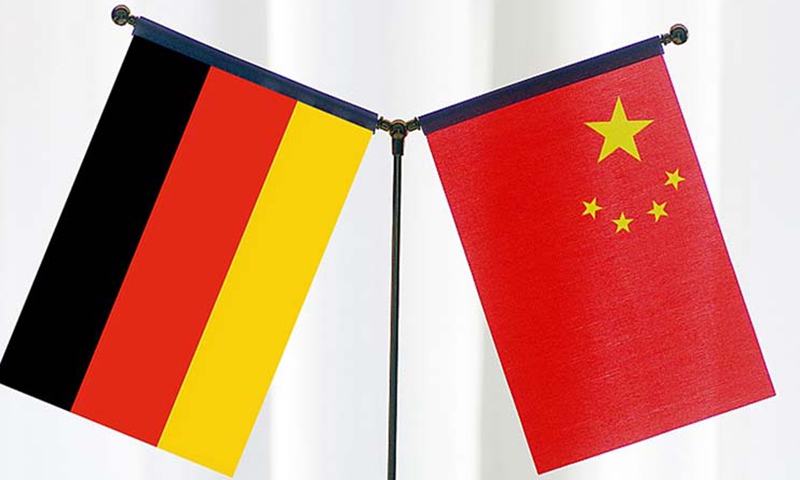Scholz must focus on pragmatic cooperation, not geopolitics, for China trip to be successful

China Germany Photo:VCG
After weeks of speculation and controversy, German Chancellor Olaf Scholz is set to arrive in Beijing later this week for his first visit to China since becoming chancellor. Scholz himself has for weeks made clear his plan to visit China, despite criticism from many in Germany and the broader Western world. But the final confirmation came from Chinese Foreign Ministry spokesperson Wang Wenbin, who announced on Friday that Scholz will pay an official visit to China on November 4.
The significance as well as the political and geopolitical implications of the visit have been covered extensively by the Western media. Here is a brief recap: The German chancellor will be the first G7 leader to visit China since the outbreak of the COVID-19 pandemic; the trip comes as Europe is mired in a series of acute economic and geopolitical crises surrounding the Russia-Ukraine conflict; it also comes as many in the West, including in Germany, are in lock step with the US’ strategic containment of China, and have been stepping up attacks against China and calling for “decoupling” from China.
In short, this trip comes at a delicate time in the relationship between China and the West. From the outset, many radical anti-China forces in Germany and beyond were against Scholz’s plan and even tried to stop Scholz from making the trip at all. After it became clear that they could not stop the trip, these radical forces shifted gear and tried other ways to derail it.
Over the past few days, various Western media outlets have been pressuring Scholz to be “tough,” repeating clichéd geopolitical attacks against China. “Scholz must send a clear message on his visit to Beijing,” asserted an article published by the Financial Times on Sunday. The author of the article argued that Scholz must “take a firm line on the importance of sanctions against Russia,” and threaten that “Germany will spread a tough, united EU position against” China’s economic policies and “political coercion.” The article also asked Scholz to tell German business leaders traveling with him to reduce “critical dependencies” on China.
Similarly, a New York Times report on Sunday claimed that as Scholz prepares for his China trip, “concerns are growing that economic dependence on China is leaving his country vulnerable – again.” In a pointed question, the article asks: “Did Germany learn from its Russia trouble?”
While this type of rhetoric in the Western media is hardly surprising, it is rather concerning that German officials are also sending the wrong signals ahead of the trip. Citing a German government spokesperson, Reuters reported on Friday that “Scholz will press China to open up its markets and will raise human rights concerns.” The spokesperson added that “Berlin's view of Beijing had changed but it was against ‘decoupling’ from the Chinese economy and wanted Beijing to show reciprocity in trade relations.”
It’s not entirely clear whether the spokesperson accurately presented Scholz’s plan for the trip or if it was a calculated move on the part of the German government to quell criticism from Germany and the West. In any case, threatening to “press” the host country with unfounded claims before a visit is wrong on many levels. It is rude, arrogant, and completely unacceptable in any setting – be it interactions between individuals or countries. Germany, or any other country for that matter, has no right or qualification to point figures at other countries’ domestic policies and internal affairs.
China’s efforts and commitment to continuously open up its market and improve the business environment for foreign businesses is clear for all to see. Anti-China Western politicians and media outlets may intentionally ignore that, but global businesses are fully aware of the progress China has made and the opportunities it presents. That’s why global businesses, including those from Germany, are refusing to “decouple” from China and want to increase their presence in the Chinese market. Scholz himself must also know this, which is why he also pushed back against the “decoupling” calls and is bringing a delegation of German businesses during the trip.
In China, the German Chancellor’s decision to come despite widespread criticism from within Germany and the broader Western world is viewed as a sign of some European leaders maintaining a rational, pragmatic position on relations with China even as some within their countries are dangerously pushing for geopolitical confrontation. The business communities of the two countries are especially encouraged by this and are hoping that the trip will help dispel unease among businesses caused by Western hostility and further enhance mutually beneficial economic and trade ties between China and Germany.
Obviously, Scholz is also aiming for concrete results from the trip; otherwise he wouldn’t go through all this to make it. But for the trip to be successful, he must be focused on pragmatic cooperation rather than geopolitics, despite pressure from radical Western politicians and media outlets.
The author is an editor with the Global Times. bizopinion@globaltimes.com.cn

